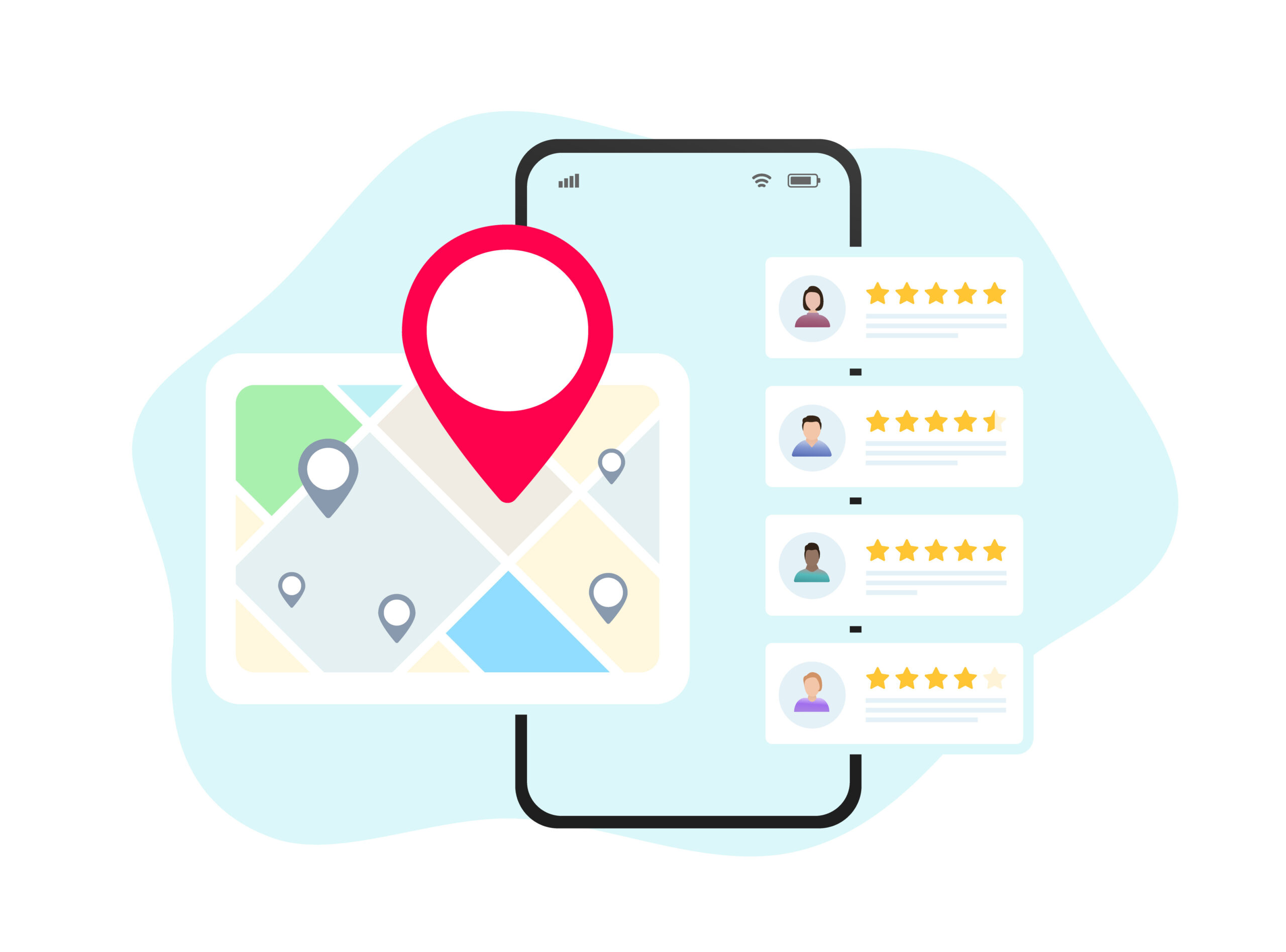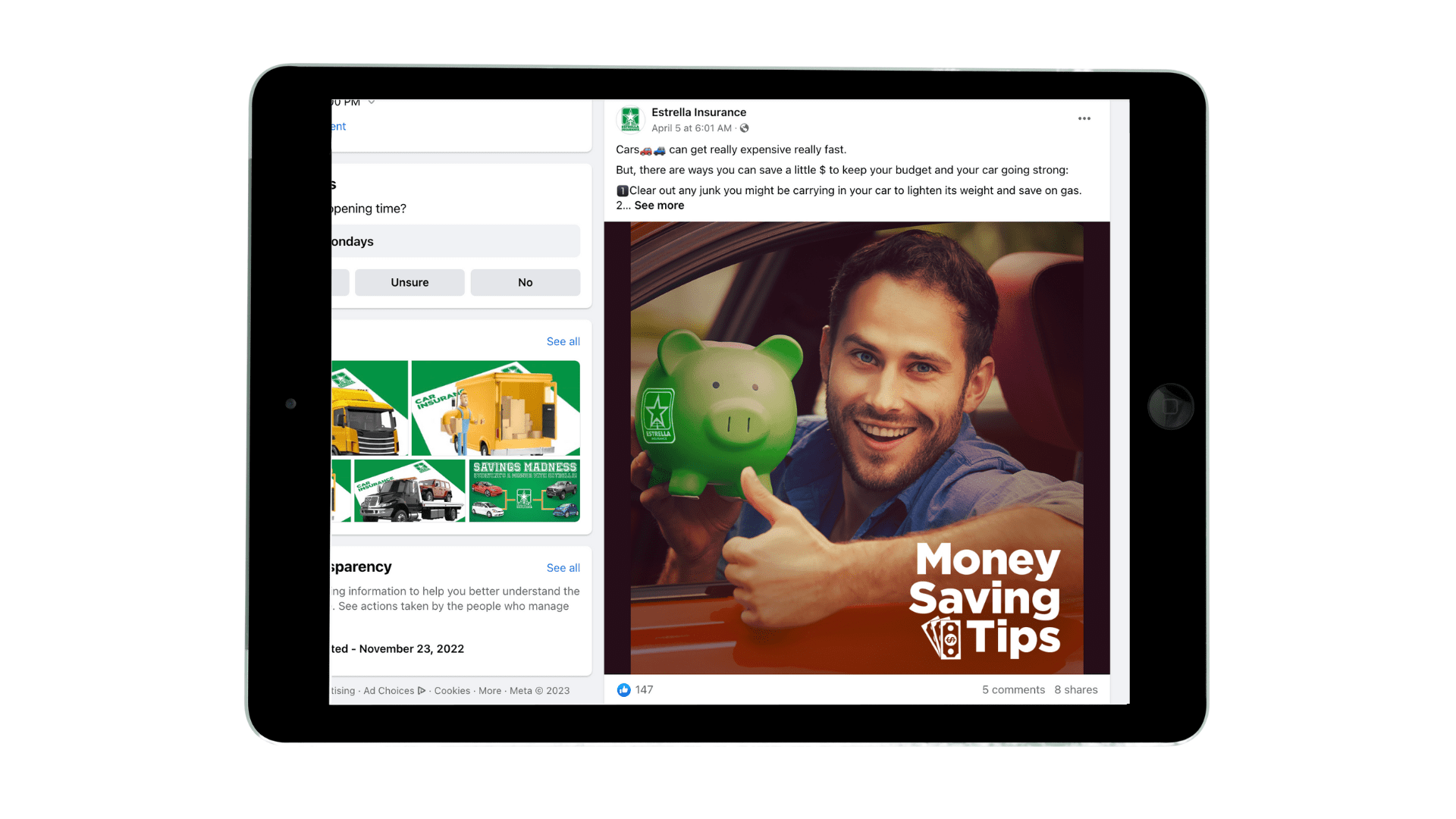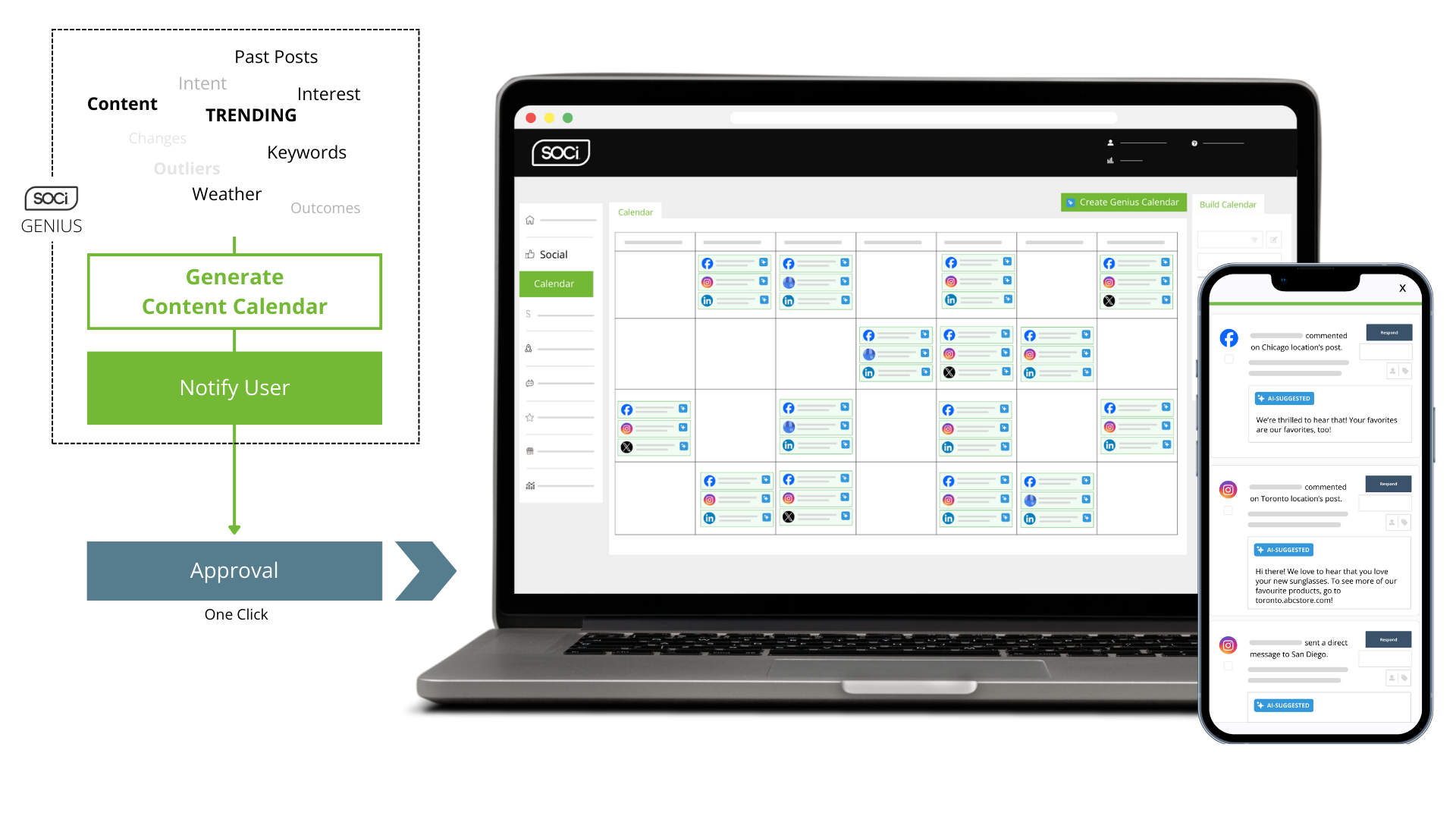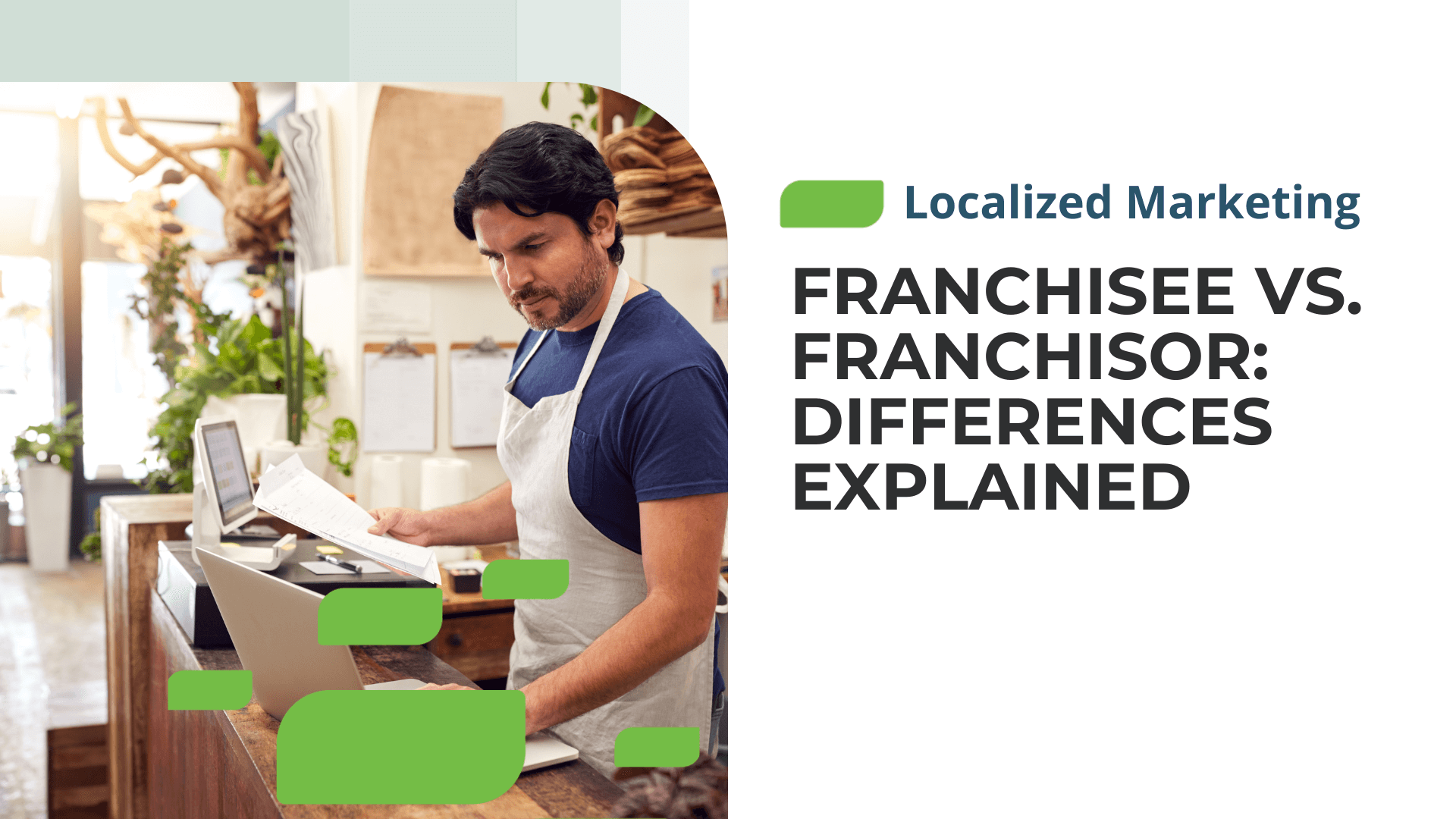Your Business’s Guide to Local Marketing

Our Consumer Behavior Index (CBI) found that 8 in 10 U.S. consumers search for local businesses weekly, while 32% do so daily. Whether you’re a multi-location or local business, you need a successful local marketing strategy to appear in local search results.
In this article, we’ll define local marketing, explain its benefits, and provide 13 essential local marketing tactics.
Let’s get started!
What is Local Marketing?
Local marketing, sometimes called location based marketing, is a digital marketing strategy that targets consumers and customers within a specific geographic radius of a business.
The goal of local marketing is to reach local consumers who are likely to purchase your products or services. In particular, multi-location businesses need a local marketing strategy to ensure their individual store locations appear in branded and non-branded local search results.
The Importance of Local Marketing for Local Businesses
Local marketing allows multi-location and local businesses to concentrate their efforts on local customers who are most likely to visit their location.
By leveraging local marketing tactics, businesses can capture more online searchers and convert them into in-person customers.
Local SEO Strategies
1. Establish Your Google Business Profile
One of the most important local listings is your Google Business Profile (GBP). Why? Because Google owns over 91% of the search engine market share.
Furthermore, consumers rely heavily on Google Search and Maps to discover local businesses. Our CBI research found that 72% of consumers use Google Search, and 51% use Google Maps to look up information about a local business.
Thus, claiming your GBPs is the first step in any local marketing strategy. It’s the most important local listing and will impact your appearance on Google Search and Maps — particularly if you land in the coveted Google 3-pack or local pack.
 Verifying your business with a GBP boosts credibility and directs potential customers to your website and storefront.
Verifying your business with a GBP boosts credibility and directs potential customers to your website and storefront.
2. Claim and Optimize Your Local Listings
Local listings are vital for boosting your business’s visibility and credibility in local search results. In addition to Google, being on multiple trusted directories, like Yelp, Facebook, Bing, Apple Maps, and others, improves your chances of discovery and boosts search engine rankings.

Moreover, consistent, accurate information strengthens your brand’s reliability and builds consumer trust, increasing foot traffic, especially for those searching for nearby services or products.
To optimize your business listings effectively, start by ensuring that all information is complete and accurate. You should also:
- Include a consistent business name, address, and phone number (NAP) on all directories
- Add relevant keywords to business descriptions to boost visibility
- Regularly update listings with new photos, events, and store updates
- Encourage customers to leave positive reviews
- Engage with clients by responding to reviews and answering questions
- Promote special offers, promotions, or events
3. Optimize Your Website and Local Listings for Non-Branded Keywords
To effectively optimize your website and local listings for local non-branded keywords, begin by conducting thorough keyword research to identify terms that potential customers use when searching for products or services in your area, without incorporating your brand name.
These keywords typically include descriptors of your offerings or services coupled with geographic identifiers, like “hamburger restaurant in Chicago” or “dry cleaners Brooklyn.”
Tools such as Google Keyword Planner, Ahrefs, or our Genius Search can help you discover these keywords.
Once you have identified relevant non-branded keywords, strategically incorporate them into your:
- Website’s content
- Title tags
- Meta descriptions
- Headers and body paragraphs in blogs
However, ensure the content remains natural, readable, and helpful — as Google prioritizes all three.
In your local listings, ensure these keywords are included in the business descriptions and service offerings, as this will improve visibility in local searches.
Aligning your website and local listings with non-branded keywords can help your brand reach a wider audience. You improve your chances of attracting a broader audience that may not yet be familiar with your business.
4. Verify Mobile Site-Friendliness
Most people searching for a local product or service will do so on their mobile devices. In fact, 76% of all local smartphone searches lead to an in-store visit within 24 hours, and 28% result in a purchase.
Thus, it’s imperative to have a mobile-friendly site. Mobile-friendliness plays a crucial role in local SEO, as search engines prioritize websites that offer a seamless experience on mobile devices. A mobile-optimized website not only improves user engagement but also boosts search rankings.
To ensure your website is mobile-friendly, it must have a responsive design that automatically adjusts to different screen sizes and orientations, providing an optimal viewing experience across all devices. You can use Google Chrome’s Lighthouse tool to test the quality of your web pages on desktop and mobile.
6. Get Active on Local Social Media
While local social media presence does not directly influence local SEO rankings, it plays a critical role in enhancing visibility and engagement with potential customers. For instance, Google is increasingly integrating social media profiles on GBPs, allowing businesses to link to their social media pages and, in some cases, automatically links them.
Additionally, trends indicate younger generations rely on social media to discover local businesses. According to our CBI report, 76% of those 18-24 said they use Instagram most frequently to look for local businesses, with TikTok coming in second at 62%.
We recommend publishing engaging social content that online consumers will find helpful or interesting, such as:
- Customer testimonials
- Behind-the-scenes
- Local events
- Partnerships with other local businesses or local influencers
- Educational videos
- Local data studies or surveys
- User-generated content (UGC)
- Seasonal offers and specials
- Announcements around loyalty programs
Having a local social media presence and incorporating it into your overall local marketing campaigns is imperative.

Customer Engagement
7. Encourage and Showcase Online Reviews
Online reviews impact both search rankings and conversions on local listings. Don’t believe us? See the stats below!
- According to local SEO experts, “high numerical Google ratings (e.g., 4-5 stars)” is the sixth most important local pack/finder ranking factor, and “quantity of native Google reviews (w/ text)” is the eighth highest factor.
- Nearly 8 in 10 consumers regularly read online reviews before making a purchase decision.
- Our State of Google Reviews research found that for every ten new reviews earned, the conversion of Google profiles improves by 2.8%.
Most local listings make it easy for consumers to leave reviews. However, you can also increase your online reviews by making it easy for someone to leave a review on your website or local pages.
8. Engage With Online Reviews
Encouraging customers to leave reviews is the bare minimum. Responding to your reviews is a larger part of your online reputation management. Review response increases customer loyalty and helps establish credibility.
Our CBI research found that 41% of consumers are more likely to choose a business that responds to its reviews.
When responding to reviews, ensure you’re authentic and honest. For negative reviews, either give an update or solution in your response or a way to contact your local business to resolve the issue privately.
 Our CBI also found that only half of consumers felt a business’s response met or exceeded their expectations. Even more troubling, only 30% said they received a response within one to two business days.
Our CBI also found that only half of consumers felt a business’s response met or exceeded their expectations. Even more troubling, only 30% said they received a response within one to two business days.
Thus, it’s imperative that you set aside time to engage with your local listings and social media profiles’ online reviews. This is an opportunity to build rapport with loyal customers and show your local audience that you care about them and are actively improving your business.
9. Get Involved in the Local Community
Being visible and engaged in your local communities is an effective local marketing strategy that can significantly boost your brand’s presence. Consider sponsoring local youth or school sports teams and participating in local charities or fundraisers.
By investing time and resources into local initiatives, you create a positive brand image and foster loyalty among community members.
10. Partner With Other Local Businesses
Partnering with other local businesses presents several significant advantages for multi-location or small businesses seeking to improve their visibility and engagement within their local area.
First, by aligning with complementary businesses, brands can benefit from shared co-marketing efforts, ultimately leading to greater outreach and awareness within the community.
These partnerships can also provide a more comprehensive and appealing experience for attendees, thereby generating buzz that enhances each brand’s reputation in the local area.
Four Partner Marketing Tactics for Local Businesses
- Co-Host Local Events: Collaborate with another business to organize community events, such as fairs, pop-up markets, or workshops, that encourage community engagement.
- Cross-Promote Services: Implement a referral program where businesses recommend each other’s services to their clientele, thereby expanding the customer base for both parties.
- Share Marketing Resources: Combine budgets for local advertising campaigns or promotional materials to achieve greater impact while minimizing costs.
- Collaborate on Social Media Campaigns: Use social media platforms to jointly promote events or special offers, maximizing exposure to each business’s followers.
11. Work With Local Publishers
Another way that franchise and small business owners can significantly enhance their visibility is by collaborating with local journalists, bloggers, and media outlets. Establishing relationships with these local media members allows businesses to gain valuable coverage and credibility in the community.
One effective approach is to invite local journalists, bloggers, or freelance writers to tour your business, introducing them to your unique offerings or services. You can also have them do write-ups on small businesses or franchise owners to give your business a face the local community recognizes.
Furthermore, many local newspapers or sites have weekly or monthly event calendars or listicles to do in an area. You should connect with these writers to ensure that your business’s events are included.
By providing press releases for new initiatives or community involvement, businesses can secure write-ups that showcase their commitment to their neighborhoods and their residents.
Local Advertising
12. Localize Your Paid Advertising
Running ads can be a more expensive local marketing strategy, but it often leads to a significant payoff. Below are some of the most common local advertising tactics that methodically target customers:
Local social media: Nearly all major social media platforms let you run geo-targeted ads to generate a target audience within a certain radius of your store’s physical location. You can also geofence by zip code, city, or state, and target via demographics and interests.
Direct mail: Sending targeted brochures or sales materials is a strong way to establish brand awareness in a local area. We recommend sending discounts to get first-time customers in the door.
Local Services Ads: Local Services Ads or LSAs are paid ads that place your business at the top of Google search results and often link to your GBP. With LSAs, you’re only charged for valid leads received from the LSA.
Google Ads: Similar to LSAs, Google Ads also appear in local searches but are often tied to a specific keyword, which businesses bid on. Another major difference is that Google Ads are pay-per-click (PPC), so you only pay when someone clicks on your ad.
It’s important to try different local paid ads to see which perform best. Once you know which ad types perform well, you can optimize them by A/B testing different target audiences, images, and copy.
Measuring Success
13. Track Your Local Marketing Efforts
To effectively track your local marketing efforts, it’s essential to utilize a combination of analytics tools that provide insights into your digital presence. Free tools like Google Analytics can help you monitor website traffic and assess how your target audience interacts with your content, while Google Search Console allows you to evaluate your search engine results, offering valuable data on keyword performance and site visibility.
Additionally, leveraging tools like SOCi’s Genius Suite can provide insights into location data, local SEO, social performance, and online reviews, helping you understand how users from specific geographical areas engage with your different business locations.
By integrating this data, you can make informed decisions to enhance your local marketing strategies and improve your overall outreach.
Power Your Local Marketing Strategy With an AI Platform
SOCi’s Genius AI-powered products are designed to revolutionize local marketing for franchises and multi-location enterprises. By leveraging advanced generative AI, our Genius AI platform simplifies and enhances local marketing strategies for every individual business location.
For instance, Genius Search provides real-time local data analysis and makes thousands of monthly local listing and SEO recommendations that you can enable in just a few clicks. It’s like having 1,000 marketers and data scientists for each location.
 When it comes to reputation management, Genius Reviews has you covered! It can aggregate feedback from all major review networks, analyze it, and craft on-brand and high-quality responses to local customers.Lastly, Genius Social uses real-time local data analysis from search engines, social media platforms, and online reviews to automatically generate monthly content calendars and engaging replies.
When it comes to reputation management, Genius Reviews has you covered! It can aggregate feedback from all major review networks, analyze it, and craft on-brand and high-quality responses to local customers.Lastly, Genius Social uses real-time local data analysis from search engines, social media platforms, and online reviews to automatically generate monthly content calendars and engaging replies.

SOCi is the authoritative solution to elevate your local marketing efforts. Head into the Genius era with us by requesting a personalized demo!





